How to choose a kitchen faucet: tips for choosing, the best options, manufacturer ratings
The main place where the most water is consumed is the kitchen.Kitchen faucets are opened and closed hundreds of times a day, so they must be subject to even more stringent requirements than other plumbing fixtures. Before purchasing, it wouldn’t hurt to study the range of products on offer, don’t you agree?
We will tell you how to choose a kitchen faucet from a variety of modifications. The article describes in detail the design and operational features, identifying the pros and cons of various kitchen faucets.
We have provided practical advice on choosing a faucet, and also listed the best manufacturers whose plumbing products have proven themselves to be the best. The information presented will help you understand which type of mixer is right for you.
The content of the article:
- Types of kitchen faucets
- Designs by water supply method
- Differences by type of fastening
- Features of the shape of the kitchen faucet
- Types of spout nozzle
- Modern manufacturing materials
- What else should you pay attention to?
- The best foreign and Russian manufacturers
- Conclusions and useful video on the topic
Types of kitchen faucets
Each mixer offered by the modern plumbing market has its own advantages and disadvantages.
The division of kitchen plumbing occurs according to several parameters:
- type of construction - method of opening water;
- spout features;
- type of installation;
- manufacturing material.
Let's take a closer look at each item separately.
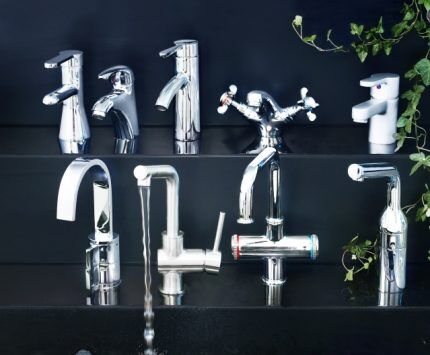
Designs by water supply method
Any mixer belongs to one of three types and can be:
- axle-box crane (two-valve);
- single lever;
- contactless.
Each type has features that are relevant when choosing and purchasing.
Mixers with two valves
These are simple classic designs in which a separate faucet box is opened to supply hot or cold water.
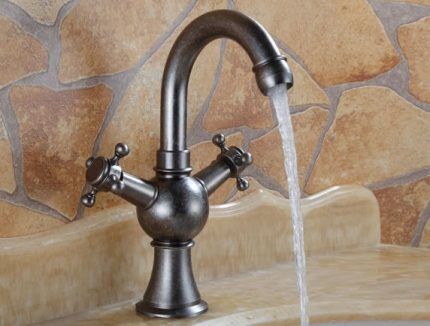
The design of the mechanism can be:
- worm;
- ceramic.
If it is built into the housing, it is impossible to distinguish its type by external signs, but you can understand which of the systems provides water supply by the number of valve revolutions. In worm-type valves, you will need to turn the valve at least three or four times; in ceramic ones, half a turn is enough.
Worm mechanism. The principle of operation is very simple - the flow of water is blocked by a retractable rod, which presses the shutter valve with a rubber sealing gasket attached to its bottom. The main advantage of the design is ease of repair.
Typically, a leak in such a faucet is caused by wear of the gasket, and the repair consists of replacing the rubber, which you can even cut out yourself. But rubber gaskets are very short-lived, so they have to be changed very often.
Ceramic faucet. The name “ceramic” does not mean that all parts are made of ceramic. The role of locking elements in the faucet box is performed by two round ceramic plates.
There are holes in the ceramic disks, one of which is fixedly fixed to the body, and the second rotates relative to it. The force of water pressure is regulated by the coincidence of these slots.
The valve can be rotated 90° (quarter turn) or 180° (half turn). The design is more reliable, but short-lived - in the event of a breakdown, the crane box is completely replaced.
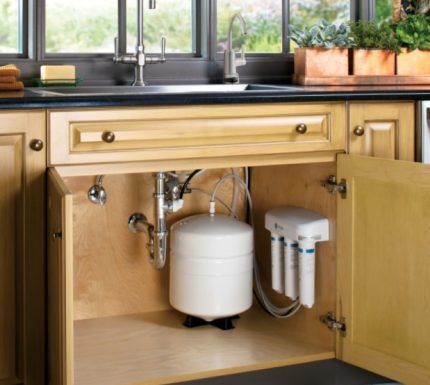
The advantages of such models include low cost, simplicity of design and maintainability - failed parts can be replaced independently.
Flaws:
- excess water consumption — when adjusting pressure and temperature, part of the water is wasted;
- inconvenience of control — you have to adjust two valves;
- difficulty of replacement — it’s not easy to choose a suitable ceramic faucet axle box.
There are “slotted” and “square” models, with different stem lengths, 120 or 24 splines for valve attachment, etc.
In order not to make a mistake, you need to take both the valve and the failed valve axle with you to the store.
Devices with one lever
Easy to use modern models, which can also be called joystick, mono-command or single lever mixers. Most of those who decide which faucet is best for the kitchen choose these designs.
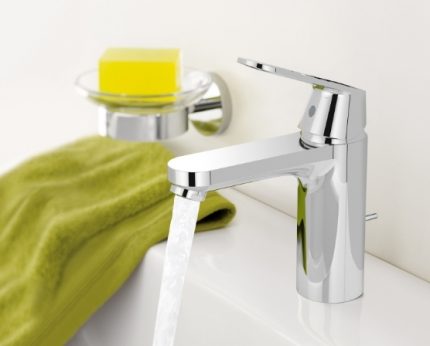
A single knob adjusts both temperature and pressure. To do this, just turn the handle left or right and adjust the height of its position.
Despite the similarity of controls, they differ in the method of mixing water - ball and cartridge. According to the body design, there are fixed and rotary models.
Devices with a ball mechanism
Water is supplied through a ball with several holes. The movements of the handle turn it and regulate the flow of hot and cold water, setting the required pressure and flow temperature.
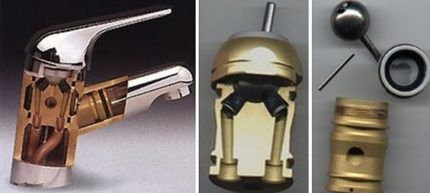
Design simplicity reduces to a minimum number ball valve breakdowns. Leaks most often occur due to the penetration of sand grains and similar inclusions into the gap between the elastic seats holding the ball and the ball itself.
Therefore, it is highly desirable that a coarse mesh filter be installed in front of the mixer. Can choose filter for washing, which will not only retain small particles, but also soften and deferrize water.
The presence of debris is indicated by the need to exert great effort when making turns. However, most often in ball devices the pressure and volume of supplied water simply decreases due to a clogged aerator.
You can clean both of them yourself, however, there is a difference in the algorithm of work. To remove grains of sand from under the seat, you will have to disassemble the mixer. To remove dirt from the aerator, you only need to unscrew it, rinse it and free it of unnecessary deposits.
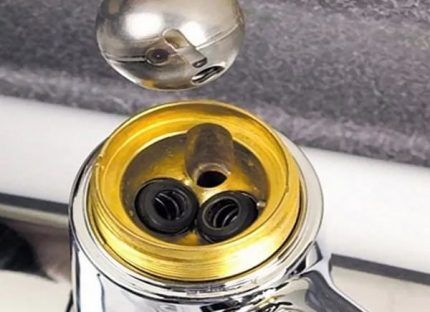
Design features of disk devices
The disk device operates on the same operating principle as ceramic faucet axle boxes: there are holes in two ceramic plates (movable and fixed), and the water pressure and temperature are set by the area where they combine.
Serious failures of disk devices can be eliminated by replacing cartridges. The simplest flaws in work, such as a simple leak, can be eliminated with your own hands. They begin to leak when a speck gets stuck between the discs.
The use of such designs, in the same way as in ball models, requires the mandatory installation of coarse filters, which increases the service life.
Types of model cases
The type of housing does not depend on the mixing mechanism, it can be:
- cast - motionless;
- rotary.
Fixed structure The body of the cast device is equipped with a side or top control lever.
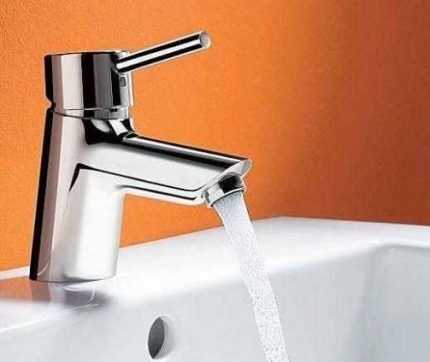
The advantages of fixed single-lever cranes include maintainability and high reliability. At the same time, it is not as convenient to control and use as a joystick, and the jet is more powerful, which can cause water to splash.
If you choose such a mechanism, it is advisable that the faucet spout be retractable. Among the most common breakdowns: loosening of the fastening ring and the spout itself, wear of the gaskets.
Rotary models. The flow is turned on and controlled by a handle, most often installed on the right side or above the spout.
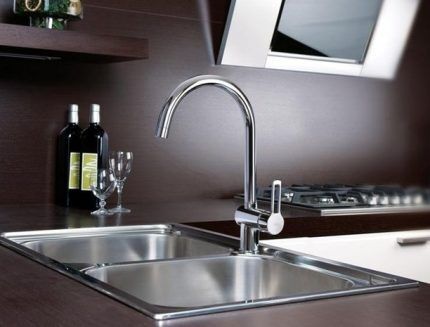
The spout moves smoothly to the sides, is securely fastened, but cannot be located at a great height. The disadvantages include wear and tear on the seals installed in the rotating part, but they can be replaced without any problems.
Advantages of single lever mixers:
- efficiency;
- ease of use;
- functional design.
Disadvantages include: rapid wear of the seal and high price. Another disadvantage is the fact that the complexity of the design requires qualified repairs.
Contactless (electronic) models
Sensory and thermostatic mixers appeared not so long ago and differ significantly from mechanical options.The main function that such a faucet performs is to supply water at a predetermined temperature.
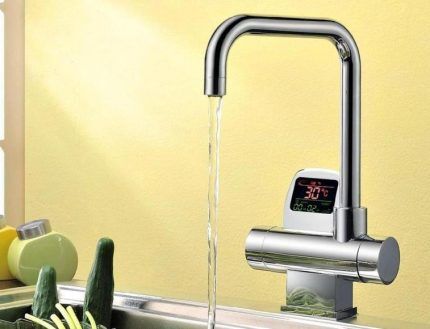
Volatile and autonomous models are available. The former operate from the mains via a 12 V adapter, while the latter require batteries to operate. When purchasing, it is better to choose a device that has the ability to duplicate manual control.
The main advantage is significant water savings, another positive detail is that there are no hand marks left on the plumbing. The main disadvantage is the high cost.
We can separately note the budget option - special attachments that allow you to modernize a regular mixer. This device is attached to the spout of the spout, runs on a battery and, according to manufacturers, saves water consumption by up to 20%.
Differences by type of fastening
In addition to design features, there is a division of types of kitchen faucets according to installation method. Place and faucet installation method influences which model to choose for a particular kitchen.
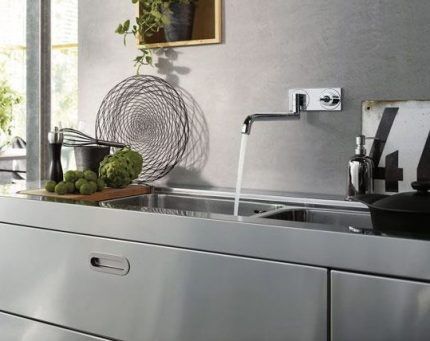
There are three ways to secure the unit:
- In the sink hole - the most common and simplest installation method that you can do yourself. Any designs are suitable.
- In countertopsYou can also install valve, lever or sensor models with swivel spouts. But before that, a hole corresponding to the diameter of the devices is drilled in the table.
- Fastening directly to the wall – only special models are suitable. The housing for such installation must be massive, and the connection with the pipes hidden in the wall must be rigid.
Fixing in a horizontal position is carried out when lever mixers are installed with pins threaded into threaded holes on the body, onto which a shaped half-washer is tightened with a nut. When installing crane-axlebox structures, a split threaded bushing is secured to the surface of the base with a nut.
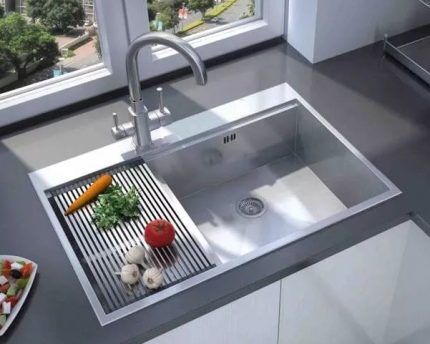
In cases where it is necessary to connect to pipes coming out of the wall, eccentrics are used to ensure correct positioning, and the fasteners are hidden with decorative conical covers.
Features of the shape of the kitchen faucet
The shapes and sizes of spouts are very diverse.
Mixers with spouts are distinguished by shape:
- L-shaped;
- R-shaped;
- S-shaped;
- J-shaped;
- C-shaped.
Regardless of the shape of the spout, the nozzles can be not only round, but also flattened or even square - the type of flow depends on this.
Spouts are classified by location relative to the sink:
- low — 15.5 cm -18.4 cm;
- average - 23.5 cm, 21.6 cm, 20 cm;
- high - 28 cm.
It is believed that faucets with a high bend and nozzles are intended for shallow sinks.But when a stream falls from a great height, it will definitely splash, and if the sink is shallow, all the splashes will scatter throughout the kitchen. The use of a low spout is associated with difficulties when filling high-volume dishes.
The problem can be solved by purchasing a spout with variable geometry, for example, a telescopic one. But a large number of connections, in the places where gaskets and hinges are installed, leads to a fairly rapid appearance of leaks.
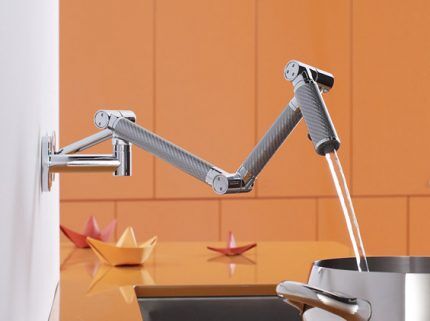
Pull-out faucets are more reliable and convenient. There is a flexible hose inside the faucet through which water flows. Most often, the hose is completely recessed into the mixer, so in appearance it looks like a regular one.
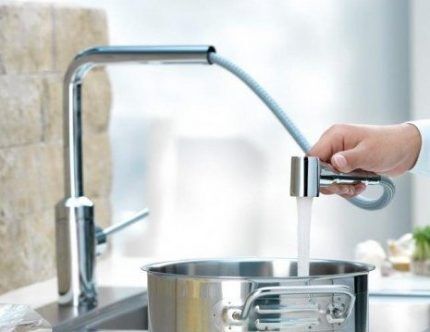
In addition to the option with the hose located in the faucet itself, there are other models in which the faucet operates separately, and the shower head is hidden in the sink or fixed next to the faucet on a special holder.
This is a universal type of mixer, and some models can be equipped with additional control of the retractable element, which allows you to save water consumption.
The choice of device should be based on the material used in the manufacture of the decorative faucet in which the hose is placed. It may be plastic, fragile and therefore break at the point of extension.
Another, but inexpensive model is a faucet, the spout of which is movable and enclosed in an elastic holder. This option is both reliable and convenient, but its design is not suitable for every interior.
Types of spout nozzle
Let's consider a small but important detail on which water savings, the ease of use of the tap, and the type of flow depend. The most popular are faucet aerators and retractable watering cans.
In such devices, water is mixed with air, resulting in significant savings - up to 8 liters per minute.
The gratings on the nozzle can be static or adjustable with variable hole sizes. Some models are equipped with nozzles that can change the direction of the jet.
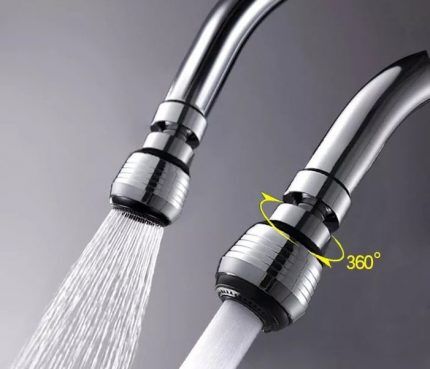
There are also add-ons that are optional, but very convenient. For example, LED backlighting, which not only becomes an additional light source, but also illuminates the dishes when washing.
An electronic thermometer allows you to obtain the necessary heating, while saving water, and it does not require additional sources of energy, because it receives it from water pressure.
Modern manufacturing materials
The design of the mixer is quite complex, so various materials are used to produce parts. The body is made of alloys, the most common of which are steel and brass - these metals guarantee high reliability. Devices made of bronze and copper are even better, but they are much more expensive.
In addition, the body can be made of plastic, ceramics and granite. The most reliable faucets are those with a metal body and ceramic internal parts.
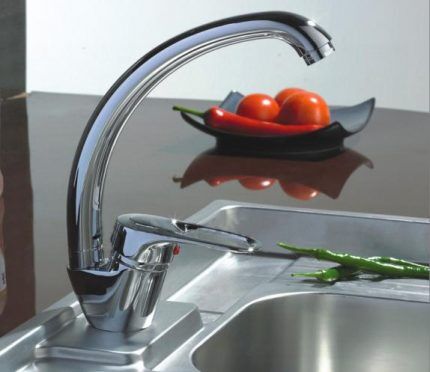
There are enough offers for plumbing fixtures made of ceramics or heat-resistant high-strength plastic. They are durable, but they can withstand mechanical shocks worse than metal ones.
You should also pay attention to the coating of the metal. Chrome-plated surfaces are durable, but they do not allow you to choose the color scheme, and they also very quickly become covered with visible dirt.
Enameled ones do not have problems with shades, but the enamel is not as durable and over time it will flake off or lose its original color. An excellent choice is a surface decorated in bronze. The stains on it are not so visible, and care is not difficult.
And one more factor that you can pay attention to is the weight of the product. A high-quality, reliable and durable faucet cannot be easy.
What else should you pay attention to?
When purchasing a mixer, in addition to parameters related to the design of the device itself, it is necessary to take into account other factors, the first of which is the size of the sink.
As already mentioned, faucet spouts have different heights. A deep sink is suitable for a low nozzle position; otherwise, filling tall, large-volume dishes with water will be problematic.
And with an excessively high tap in combination with a shallow sink, the surrounding surface will always be covered with splashes. Therefore, the ratio of these sizes should be taken into account.
The problem can be solved by purchasing a kit that includes a faucet along with a sink - in this case, you won’t have to think about the ratio of parameters, they are calculated by the manufacturer.
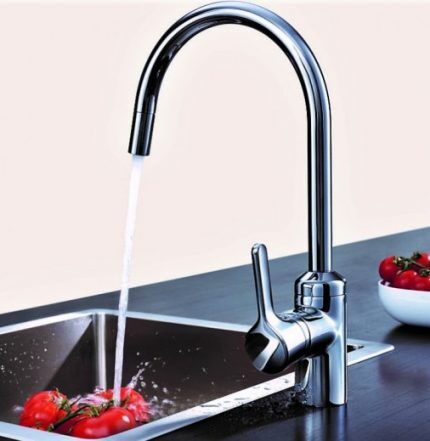
The ability to rotate the spout - most often the tap can be rotated 120-140° and 180° for expensive models. But if the sink is located in a corner or against a wall, this indicator is not so important. And vice versa - when choosing equipment for a sink installed on an island, it is best if the spout can rotate around its axis.
Additional features need to be taken into account. For example, in some models of single-lever devices, the manufacturer pre-installs a coarse filter. This protects the mechanism from small particles, and frees owners from having to install it themselves.
There are devices equipped with carbon filters for drinking water. Such devices come either with one spout, in which tap and filtered water do not mix, or with two spouts: the first is drinking, the second is “technical”.
On the body of some models, switches are installed to supply water to the washing machine and dishwasher.
There are models that not only turn to the sides, but can also completely fall down and “lie” on the sink.
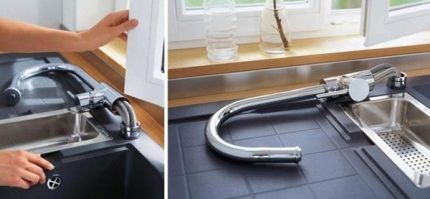
The best foreign and Russian manufacturers
It is clear that a good product cannot be cheap, but cost is not always best kitchen faucets is beyond the realm of possibility. When choosing, you should focus not only on the price, but also on the brand.
Well-known manufacturers produce both budget and luxury models. At the same time, their established reputation means much more to them than petty savings, therefore, regardless of the price, faucets from such brands are always of high quality.
The quality, durability and convenience of your plumbing fixtures depends on the manufacturer’s brand.
If we look at the rating of kitchen faucets by country and specific manufacturers, we will see that the first places are distributed as follows:
- Germany — SIEMENS ag, Grohe, Dornbracht, Viega, Kaldewei, Hansa, Schock, Axor, Ideal Standard, Hansgrohe, Franke, Blanco;
- Italy — Jacuzzi, Rifra, Piados, Duka, Zucchetti, Roca, Webert, Bonomini, Carlo Frattini, Webert;
- France — Jacob Delafon;
- Finland – Oras;
- Sweden – Alfa Laval;
- Bulgaria – Vidima;
- Switzerland – Gustavsberg;
- Spain - Roca;
- Denmark – Damixa.
Among Russian companies producing plumbing fixtures, the companies' products deserve attention "Aquatone", "Sunmix", "Santekhpribor".
Products from these manufacturers guarantee long-term and convenient operation, are reliable and can work for a long time without breakdowns.
Conclusions and useful video on the topic
Some useful tips and a brief overview of modern kitchen devices:
The variety of mixers presented on the Russian market can confuse any buyer. But if you understand in advance what design, shape, functionality and appearance you require, the choice will not be a big problem.
Are you looking for a practical and convenient kitchen sink faucet? Tell our readers which option you prefer. You can leave comments on the article and ask questions in the form below.

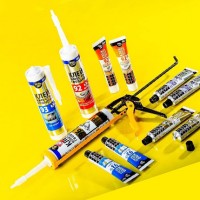

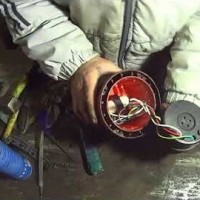
In my kitchen there is a regular two-handle mixer, which is fixed in the sink hole, J-shaped, made of a metal alloy coated with chrome. I consider other modern models to be unreasonably complex in design, which is why, in my opinion, they break more often - these are contactless (electronic), single-lever models. If I were changing the faucet in my kitchen, I would probably choose a different shape; all other parameters satisfy me.
Both in the kitchen and in the bathroom I have single-lever faucets of the same type made of my favorite material - stainless steel. Ball water mixing mechanism, rotating body design, both installed directly above the drain. The decisive criteria for choosing a mixer for me were fast temperature regulation, low price and maintainability.
Snezhana, single-lever ones, in practice, are not always as convenient as they seem. The idea is good - the pressure is turned on, and the temperature is already adjusted. But this is only at first glance. In fact, the temperature of cold water varies depending on the weather and time of year. The temperature is hot - generally for reasons beyond our control (as well as the pressure in both lines). As a result, you still have to check and further adjust almost every time.
For me, the simpler the better. Among the innovations, I like the spouts with a hose. It’s really very convenient and practical, especially when you need to wash something big.
I came to visit a friend; he recently finished renovating his kitchen. I really liked the option with a touchless faucet.Since water only flows when dishes or hands appear under the tap, this is quite economical. Plus, the faucet does not get dirty from dirty hands, because it does not require touching. The only caveat is the steep prices for such plumbing fixtures, but over time everything will pay off.
For a long time I was looking for information about how to choose a faucet for the kitchen. I scoured the entire Internet until I came across this article
https://sunfurni.ru/kak-pravilno-vybrat-smesitel-dlya-kuhni/